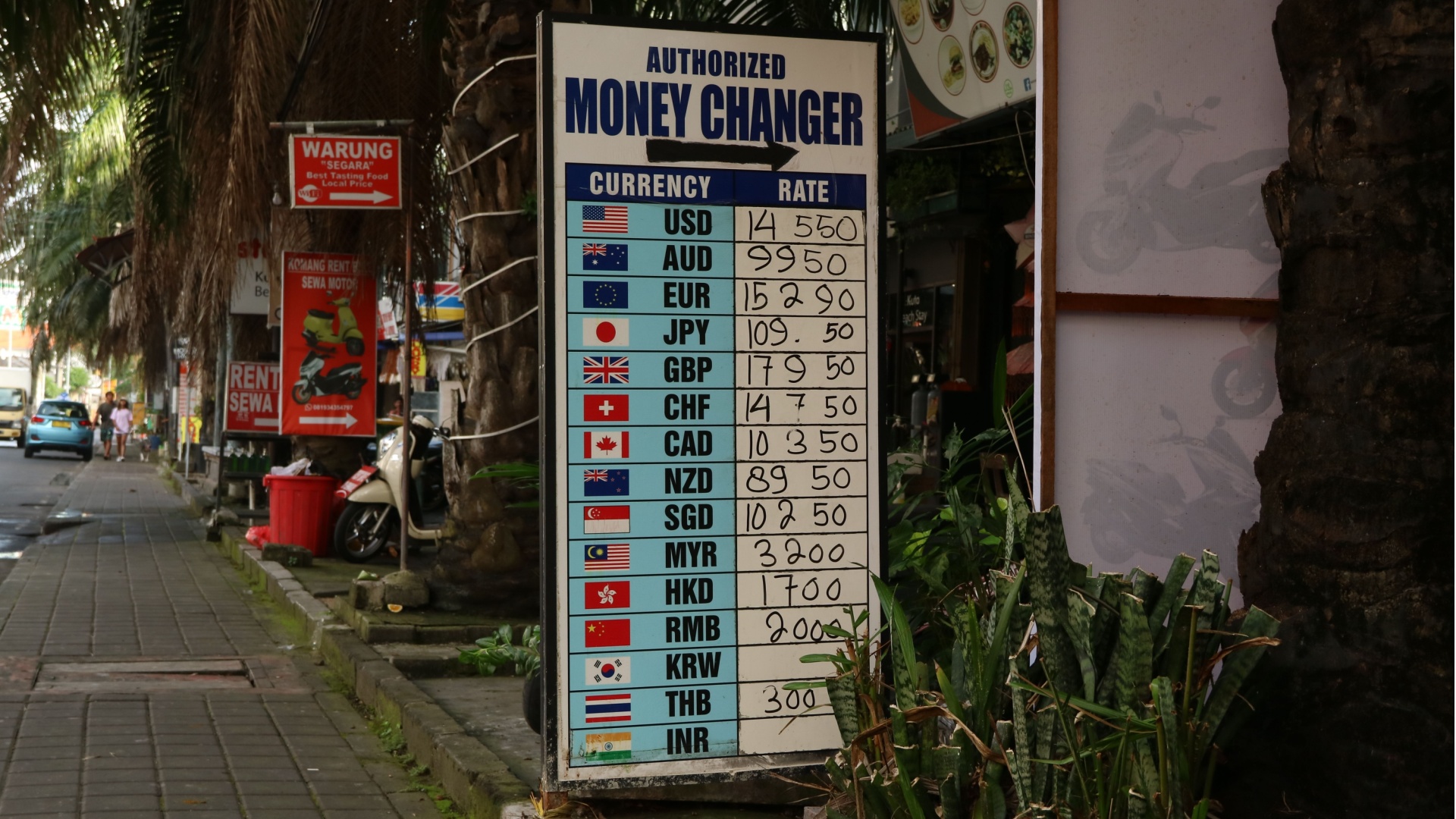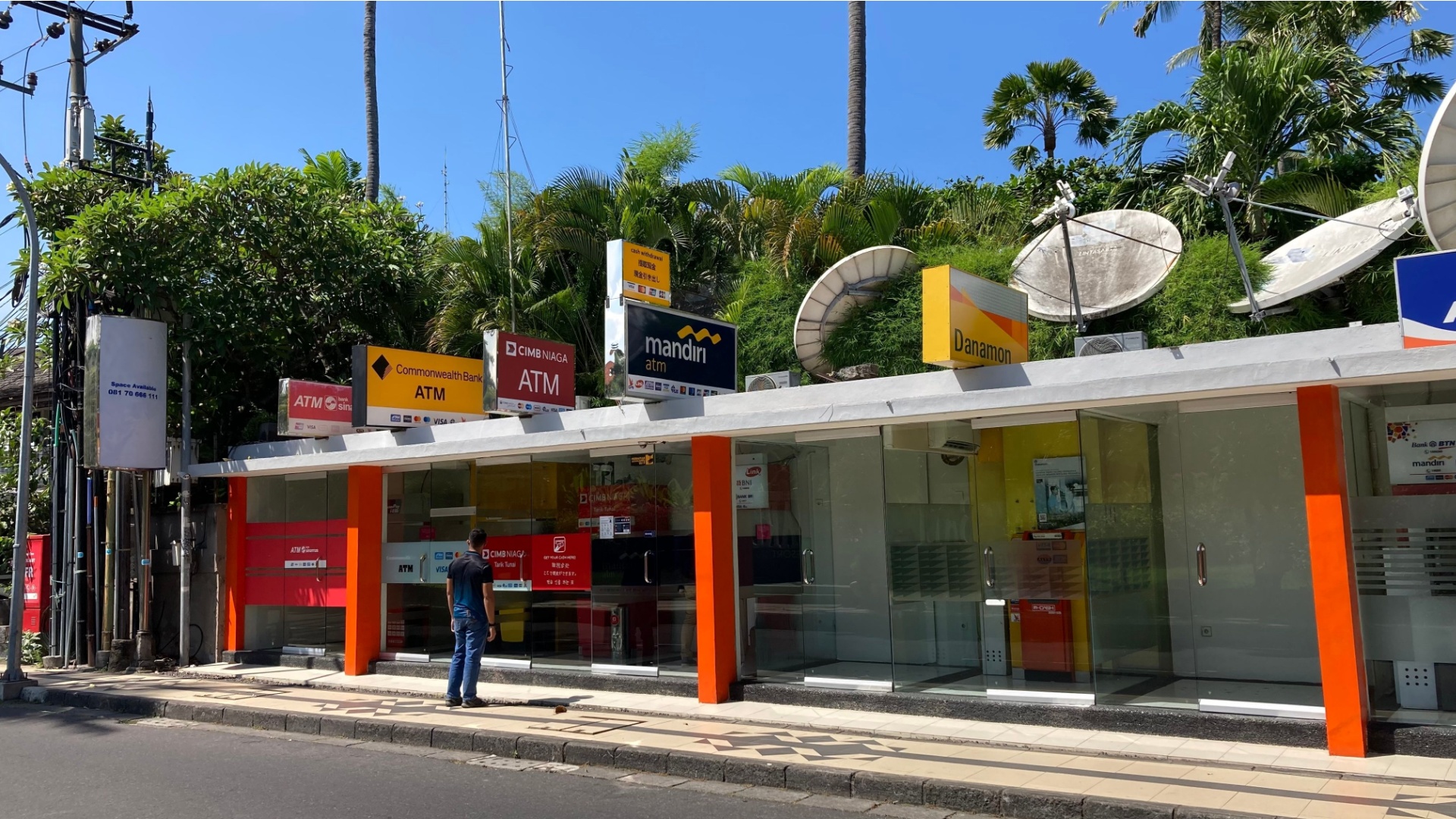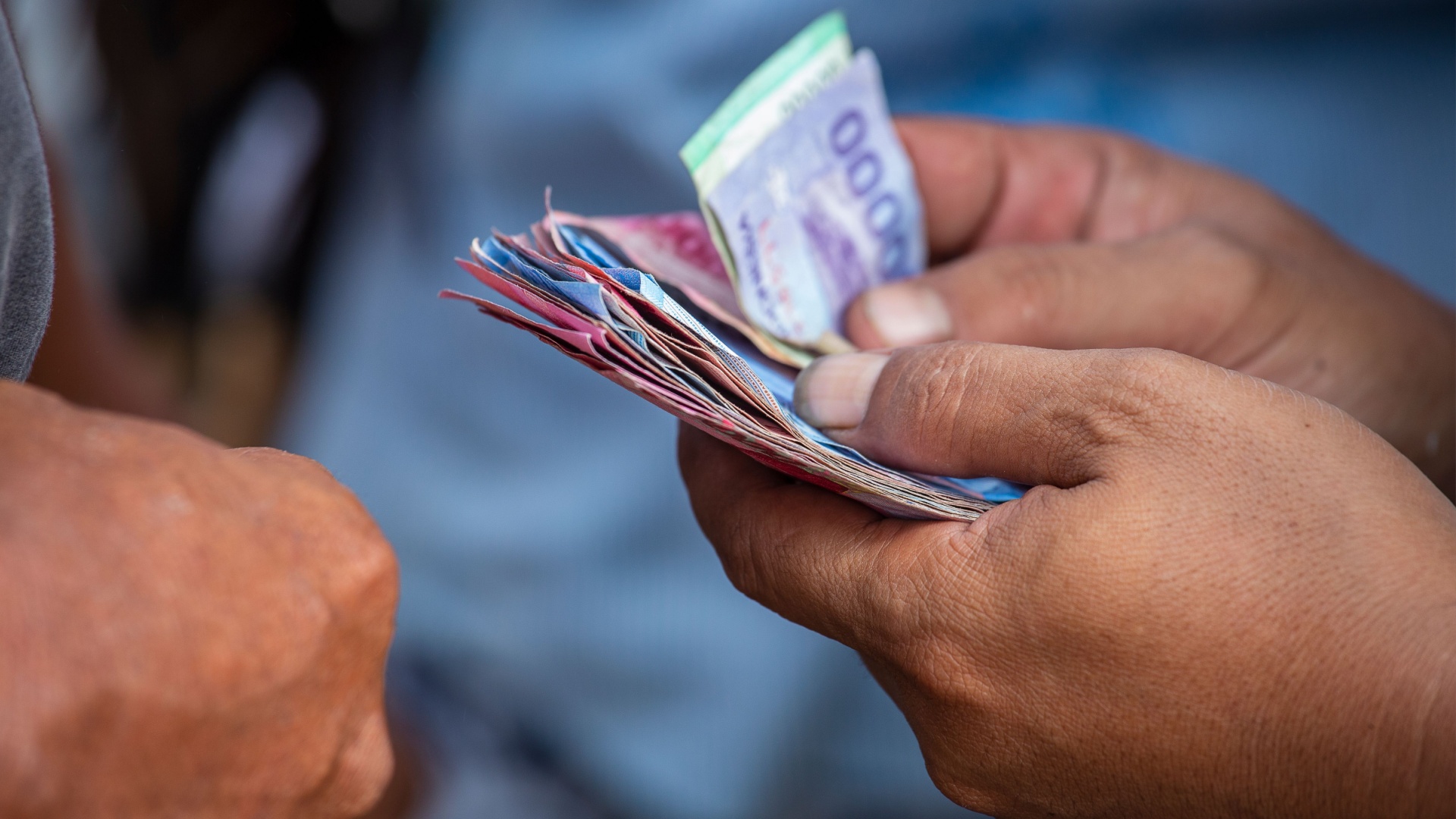Before you pack and board the plane, get a rundown on Bali currency.
Skip the complexities and potential mistakes that may ruin your vacation with our complete guide.
Let’s rip in…
What is the Official Currency of Bali?
So, what is Bali’s money? Well, the Indonesian Rupiah (the IDR). While you’re soaking up the sun and browsing through the shops, you’ll see both banknotes and coins (yes, like in the US, Europe, and a bunch of other places).
In terms of coins, you’ll see a 50, 100, 200, 500, and 1000, while your notes include 1,000, 2,000, 5,000, 10,000, 20,000, 50,000, and 100,000.
And how about the exchange rate? What can you expect for your bucks (or pounds, Australian dollars, Euros, etc.?). Briefly, the following (but bear in mind, they’ll change all the time):
- 100,000 Indonesian Rupiah gives you 9.34 AUD.
- 100,000 Indonesian Rupiah gives you 6.22 USD.
- 100,000 Indonesian Rupiah gives you 5.72 Euro.
- 100,000 Indonesian Rupiah gives you 4.87 GBP.
That means you’re going to end up with a lot of Rupiahs, so bear this in mind!

Where To Exchange Currency
And where do you get the currency? Well, you’ve got a few options… and we recommend choosing with care, because honestly, some places charge through the nose!
Popping into your bank before you leave your country of origin is one of the best choices; you’ll know you’re getting genuine cash, and you won’t be paying crazy fees in most cases. Be aware that they may have to order the money in, so do this in advance!
When exchanging money in Bali, you have several options, each with its own advantages and disadvantages. The most common places to exchange currency are:
- Airports: Convenient but often come with higher fees and less favorable exchange rates.
- Banks: Generally offer reliable exchange services with fair rates, though they might have longer wait times and specific operating hours.
- Authorized Money Changers: Often provide the best rates but require caution to avoid scams.
Tips for Avoiding Scams and Identifying Legitimate Exchange Services
While authorized money changers can offer great deals, it’s essential to know how to identify legitimate services to avoid being ripped off. Here are some tips:
- Look for Licensed Money Changers: Only use services with a clear “Authorized Money Changer” sign and a license number displayed prominently. Legitimate businesses often have better security and more transparent operations.
- Check for Consistency in Rates: Be wary of money changers offering rates significantly better than the market average. This could be a bait to lure you into a scam.
- Count Your Money Carefully: Always count your money before leaving the counter. Some unscrupulous operators may use tricks, such as slight of hand, to shortchange you.
- Avoid Exchange Services on the Streets: Street-side money changers may seem convenient but are often less trustworthy. Stick to reputable, well-established businesses.
- Look for Reviews and Recommendations: Before exchanging money, check online reviews or ask for recommendations from locals or other travelers.
Comparison of Exchange Rates at Different Locations
Exchange rates can vary significantly depending on where you exchange your money. Here’s a general comparison:
- Airports: While airports provide the convenience of exchanging money as soon as you land, they often come with less favorable rates and higher fees. It’s best to exchange only a small amount here, enough to cover immediate expenses.
- Banks: Banks offer a good balance of fair exchange rates and security. They are a reliable option, especially if you’re making larger exchanges. However, banks may have specific hours of operation and longer processing times.
- Authorized Money Changers: Authorized money changers in tourist areas often provide the best exchange rates. Look for well-known chains or those recommended by travel guides. Remember to verify their authenticity to ensure you are not scammed.
By knowing where to exchange your money and how to identify legitimate services, you can make the most of your money exchange experience in Bali, ensuring you get good deals while staying safe from potential scams.

Using ATMs in Bali
What about when you have to use an ATM in Bali? It happens sometimes; you run out of cash, and you need to get a little more spending money, but what machines can you trust? Well, high up on the list? Bank ATMs.
These ATMs are more likely to be monitored closely, meaning they’re less likely to be targeted by scammers installing devices like cameras or skimmers. You’re also generally safe with machines inside shopping centers where there’s security around. Machines out on streets, especially away from main thoroughfares, are much dodgier – treat them with caution!
Credit Cards and Digital Payments
Prefer to whip out the plastic instead of carrying around a lot of easy-to-lose notes or heavy coinage? Easy; most places in Bali will take credit cards and debit cards these days! You’ve got digital payment options too, though you can’t depend on this absolutely everywhere you go.
If you’re going to use your credit card, make sure you’ve checked with your bank in advance, so you don’t get whacked with high fees unexpectedly – some banks go shockingly high when you’re travelling abroad. Some credit cards have low fees or even no fees; frequently travelers should definitely check these out!
Alternatively, digital payments like GoPay and OVO can be good options because they’re often lower in fees and can be more secure. Still, check out the fees before you go – better to know in advance than to unexpectedly find you’re paying extra.
Always maximize security by only using your card in reputable places (cash is your friend if you’re not sure about the vendor) and keep a close eye on your account for anything that looks funny. Spot something off? Call your bank straight away!

Budgeting and Typical Costs
If you’re thinking of cash for your trip, how do you figure out how much? Well, it’s tricky, but you should start by drawing up a budget. That’s going to include costs for accommodation, activities, meals (in and out!), and transport: these are the biggest categories in most trips.
The impromptu moments often have little extra expenses, whether you suddenly decide you’re hitting up a high end restaurant instead of making dinner, or you’re going to spend a few hours at an online casino playing the Whales of Cash slot from the comfort of your hotel balcony, watching the sun set with a cold Bintang. Great fun, but… yeah, you need some extra cash in your budget for it.
Average Costs for Common Expenses
Understanding the typical costs in Bali can help you budget more effectively for your trip. Here’s a breakdown of average expenses you might encounter:
Meals:
-
- Local Warungs (Small Eateries): Meals can cost between IDR 20,000 to 50,000 (approximately $1.50 to $3.50 USD).
- Mid-Range Restaurants: Expect to pay at least IDR 70,000 to 150,000 (approximately $5 to $10 USD) per person.
- High-End Dining: Prices at upscale restaurants can range from IDR 200,000 to 500,000 (approximately $14 to $35 USD) or more per person.
Transportation:
-
- Local Buses (Bemo): Very affordable, costing around IDR 5,000 to 10,000 (less than $1 USD) for short distances.
- Taxis and Ride-Hailing Services (Grab, Gojek): A short ride might cost between IDR 30,000 to 60,000 ($2 to $4 USD). Always ensure the meter is on or agree on a price beforehand.
- Motorbike Rentals: With a little bit of negotiating renting a motorbike typically costs around IDR 60,000 to 100,000 ($4 to $7 USD) per day if you are renting for a few days.
Accommodation:
-
- Budget Hostels: Dorm beds are available for around IDR 100,000 to 200,000 ($7 to $14 USD) per night.
- Mid-Range Hotels: Private rooms can range from IDR 300,000 to 800,000 ($21 to $56 USD) per night.
- Luxury Resorts: High-end resorts and villas can start from IDR 1,500,000 ($105 USD) per night and go much higher depending on the location and amenities.
Activities:
-
- Cultural Tours and Sightseeing: Entrance fees for temples and attractions usually range from IDR 30,000 to 100,000 ($2 to $7 USD).
- Adventure Activities (Surfing, Diving, Trekking): Prices vary significantly, but a diving trip might cost around IDR 1,000,000 to 1,500,000 ($70 to $105 USD).
Tips for Budgeting Your Trip
To manage your expenses effectively and make the most of your budget in Bali, consider the following tips:
- Plan and Prioritize: List out the must-do activities and allocate a portion of your budget accordingly. This helps in avoiding overspending on less important items.
- Set a Daily Budget: Determine a daily spending limit based on your overall budget. This can help you monitor your expenses and adjust as needed.
- Use Cash Wisely: While carrying some cash is necessary, use credit cards and digital payment methods where possible to track your spending more easily.
- Eat Like a Local: Enjoying meals at local warungs not only gives you a taste of authentic Balinese cuisine but also helps save money.
- Bargain Smartly: In markets and with street vendors, bargaining is expected. However, always do so respectfully.
Importance of Carrying Small Denominations for Daily Transactions
In Bali, it’s crucial to carry small denominations of the Indonesian Rupiah for everyday transactions. Here’s why:
- Ease of Transactions: Small denominations are practical for making payments in local markets, for street food, or for short taxi rides where large bills may not be accepted or change might be an issue.
- Tipping and Gratuities: Tipping is customary for various services like porters, housekeeping, and guides. Having small bills makes it convenient to leave appropriate tips.
- Avoiding Overpayment: When you have smaller denominations, you can pay the exact amount, avoiding situations where vendors might claim not to have change, which can sometimes result in overpayment.
By understanding the average costs, planning your budget, and carrying the right denominations, you can ensure a smooth and enjoyable experience in Bali without financial stress.
Currency Conversion Apps and Tools
Need to suddenly convert more money? An app might be your answer. The XE Currency app is a great start, and will let you convert money, track payments, access exchange rates, and more.
Alternatively? Currency Foreign Exchange Rate gives you a ton of information and real-time data on tons of currencies (even Bitcoin!) and updates each hour. And if you’ve got no internet? No problem; there’s an offline mode.
You’ve also got All Currency Converter, which shows fluctuations and trends, bank rate information, and even has a tip calculator (perfect for restaurant nights!). Use these to check when the currency conversions are in your favor and keep your expenses down.
Safety Tips
Nothing ruins a great vacation like losing a bunch of cash… so what can you do?
Well, first off, don’t carry more cash than you need (plus a little leeway). Hide cash securely in your room, split it into various places, in case someone breaks in.
Next, carry any cash next to your body in a secure, zipped pocket (preferably to a wallet, which can be easily lifted from your bag). A money pouch may work for you. Some people even go so far as to carry a fake wallet as a decoy!
If you lose money or cards, start by informing the local police, who may be able to help. Next, call your bank (if you’ve lost a card) so you can cancel it and get any charges reversed. Finally, check whether your travel insurance covers you for the loss – fingers crossed here!
FAQs
Q: Do places in Bali take dollars/euros/pounds?
A: In general, no – some large chains do, but they’ll often charge more, and the local shops won’t take foreign currencies at all! Don’t “bank” on it (pun intended). Note that since 2015, your hotel will charge you in Indonesian Rupiah automatically (even if they offer other options too).
Q: Can I use my card everywhere?
A: No – probably not. A lot of places in Bali do take credit cards (and yes, digital payments), but you’re still going to want cash for the places that don’t!
Q: Do I tip in Bali?
A: Tipping’s always a landmine… but the good news is, no, you don’t need to worry about this in Bali, although you can tip 10% if you’re super impressed with the service!
Q: Is the money confusing?
A: Honestly, a lot of people get confused by Bali currency, yes – all those 0s! You might find it helps to take a pencil and write down the figure when you’re dealing with a vendor, so you don’t get confused.
Q: What should I do with extra currency?
A: Got some cash left after your trip? You’ve got a few options. First, save it (let’s face it – you’re going back to Bali!). Alternatively, sell it to a friend who’s heading there next.
If neither of those work for you, you can sell it back to your bank, but be aware you won’t get the full amount back!
Conclusion
So, feeling prepared for your Bali trip and managing Bali currency? You now know the notes and coins, you know where to get them, and you know how to identify safe ATMs. Combine that with your new budgeting power, conversion apps, and safety tips, and you’re well on your way. Forward planning is a major key to having a great trip that isn’t marred by mini (or even major) disasters to do with your finances!
Keen for more travel trips? Check out the rest of our blog; we have a ton of advice, guides, and hacks for making any vacation a hiccup-free ride to dreamland!


